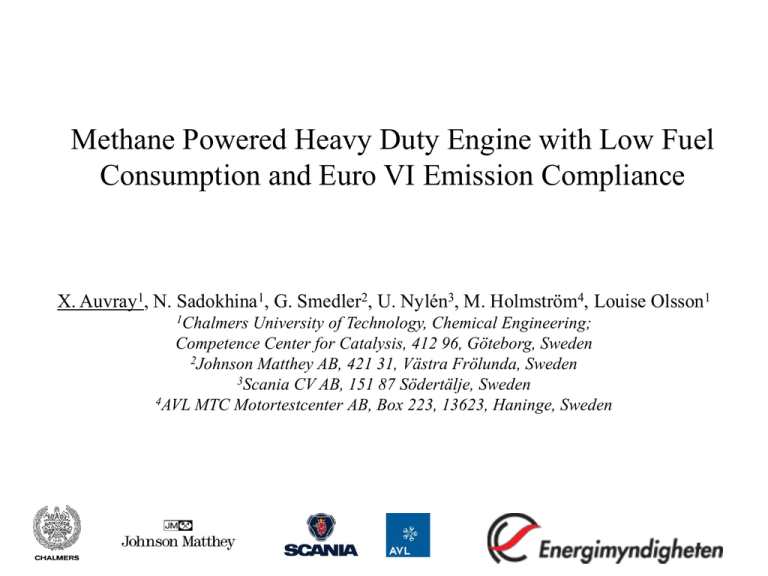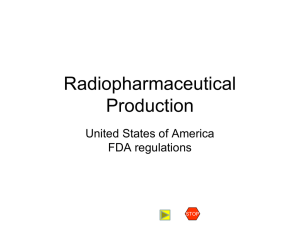O 2 - Energimyndigheten
advertisement

Methane Powered Heavy Duty Engine with Low Fuel Consumption and Euro VI Emission Compliance X. Auvray1, N. Sadokhina1, G. Smedler2, U. Nylén3, M. Holmström4, Louise Olsson1 1Chalmers University of Technology, Chemical Engineering; Competence Center for Catalysis, 412 96, Göteborg, Sweden 2Johnson Matthey AB, 421 31, Västra Frölunda, Sweden 3Scania CV AB, 151 87 Södertälje, Sweden 4AVL MTC Motortestcenter AB, Box 223, 13623, Haninge, Sweden Methane Powered Heavy Duty Engine with Low Fuel Consumption and Euro VI Emission Compliance The target for this project proposal is to address the problem of combining low energyspecific fuel consumption with low GHG and very low toxic emissions for a state-of-the-art CNG/CBG engine. The project will support the introduction of renewable fuels for Euro VI vehicles. Euro VI emissions will be met by engine tuning and by developing next generation of exhaust aftertreatment system for methane powered engines. Reduction of CO2 emissions will be reduced by 10 %. Catalyst model for methane exhaust system for both stoichiometric and mixed lean combustion Project time: 2013-03-01 - 2015-08-30 Program: Energy and Environment Funded: 50% from The Swedish Energy Agency Compressed Natural Gas as vehicle fuel • To decrease mineral oil consumption • To decrease greenhouse gas and pollutants emissions 3 Compressed Natural Gas as vehicle fuel: emissions • Natural gas is mainly composed of methane • Natural gas impurity content (ex: S) is low • CNG vehicles emit less: – CO2 – NOx – Particulate matters (PM) – Volatile Organic Compounds (VOC) • CNG vehicles emit methane (GHP= 23) 4 Natural gas vehicles: worldwide count Country Natural Gas Vehicles Refuelling Stations Date www.iangv.org 5 Catalyst preparation: The catalyst contains 3.2 wt.% of Pd and 0.6 wt.% Pt on 20 wt.% Ce-Al2O3 Support: 20 wt.% Ce-Al2O3 (S = 114 m2/g) calcined in air at 900 oC, 2 h; Ceramic monolith: 400 cpsi; l = 20 mm, d = 21 mm; Washcoat: 500 mg calcined in air, 600 oC, 2 h Catalytic activity measurement: Pre-treatment Ramp test 1. Reduction T = 500 oC; 2% H2; Ar; 30 min 2. Lean/rich/lean cycle T = 700 °C 700 Temperature (oC) Pretreatment: Lean: 0,03% CO; 0,05% NO; 0,05% CH4; 8% O2; 5% H2O; Ar; 60 min 2; 3 600 500 1 400 Rich: 2% H2; 5% H2O; Ar; 20 min 3. Ageing T = 700 C; 8% O2; 5% H2O; Ar; 30 min 300 200 Ramp test (Lean conditions): 100 0 0 60 120 180 240 300 360 420 480 540 600 Time (min) Heating/cooling cycle T = 150 - 700 oC; ramp = 5 °/min 6 Methane oxidation: simple gas composition CH4 conversion (%) 100 Mixture: CH4 + O2 solid line - heating dash line - cooling 75 without H2O heating cooling Eact = 101 kJ/mol Eact = 77 kJ/mol 50 25 3.2Pd-0.6Pt/Ce-Al2O3 0 200 250 300 350 400 450 o 500 550 600 Temperature ( C) Conditions: 0.05% CH4; 8% O2; Ar T = 150 - 700 oC; ramp = 5 °/min Temperature of 50% conversion CH4, oC Gas mixture Heating Cooling CH4 + O2 329 305 24 oC Methane oxidation: complex gas composition CH4 conversion (%) 100 solid line - heating dash line - cooling Mixture: CH4 + O2 + CO + NO 75 without H2O heating cooling Eact = 115 kJ/mol Eact = 83 kJ/mol 50 25 Inhibiting effect of CO + NO: -Increase of Eact -Increase of T50 -Decrease of hysteresis amplitude 3.2Pd-0.6Pt/Ce-Al2O3 0 200 250 300 350 400 450 o 500 550 600 Temperature ( C) Conditions: 0.05% CH4; 8% O2; 0.03% CO; 0.05% NO; Ar T = 150 - 700 oC; ramp = 5 °/min Temperature of 50% conversion CH4, oC Gas mixture Heating Cooling Amplitude CH4 + O2 329 305 24 oC CH4 + O2 + CO + NO 348 332 16 oC Reaction order calculation: complex gas composition Conditions: without H2O; 0.05% CH4; 0.05% NO; 0.03% CO; 8% O2; Ar T = 305 oC O treatment O treatment 2 CH4 conversion (%) 60 O2 treatment 700 - 305 oC 2 700 - 305 oC 700 - 305 oC 0 NO O2 change CH4 change CO change NO change 50 40 0 CO 30 0 CH4 100 ppm 20 0 O2 100 ppm 200 ppm 800 ppm 1400 ppm 0.14 % 12 % 1100 ppm 10 0 0 120 240 360 Reaction order 480 600 Time (min) 720 840 960 CO conc. CH4 conc. O2 conc. NO conc. 100; 300; 500; 700; 800 ppm; Order is 0 200; 500; 800; 1100; 1400 ppm; Order is 0.4 0.14; 2; 5; 8; 12 %; Order is 0.1 100; 300; 500; 700; 1100 ppm; Order is – 0.3 1080 Kinetic modeling Reaction: CH4 + 2O2 CO2 + 2H2O Reaction rate: r= k [CH4]α [O2]β Rate constant: k=A exp(-Eact/(RT)) Build a model and implement kinetic parameters experimentally measured to model experimental data Kinetic modeling: global model r= k [CH4]α [O2]β k=A exp(-Eact/(RT)) A E tuned 101784 (exp) CH4 conversion (%) Simple mixture: CH4 + O2 Model Exp heating Exp cooling Inlet gas temperature (°C) Acknowledgments Swedish Energy agency (FFI 37179-1) is greatfully acknowledged for the financial support.







